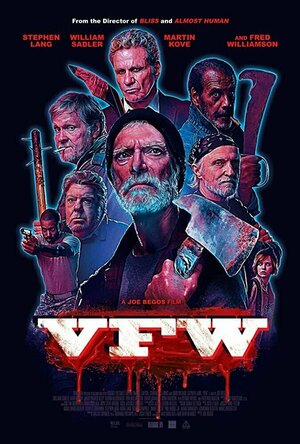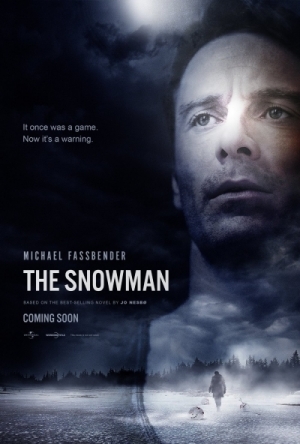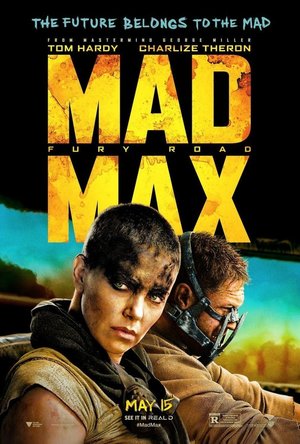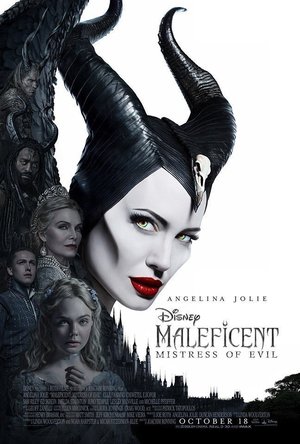Emma @ The Movies (1786 KP) rated VFW (2019) in Movies
Jun 8, 2020
When a young girl's plan for revenge goes awry she leads a drug fueled army to the doorstep of the local veterans club. The group must defend their home away from home and try to survive until the morning.
The opening scene paints a picture of a slightly dystopian present/future where drugs run rife and cities are shells of their former selves. There are addicts and revellers all in different states and they're either in lively party spirits or high and out of it. Right from the off I found the set up confusing because you're watching something that is difficult to assess, the darkness makes it almost impossible to gauge the surrounding and you're thrown for a loop when they cut to the bright afternoon scene that is pinpointed by captions to just three hours later.
VFW definitely has a heavy 80s vibe to it. The titles, the background hum of music and the style of the filming. The colours are great but it is incredibly difficult to see anything unless you're watching it in anything but darkness. On my first watch I found myself squinting and peering at the screen trying to decipher what was going on.
There's no logical consistency to things that happen even if you take into consideration that half the characters are supposed to be drugged up to the eyeballs. The event that starts off the whole caper gives you a fairly clear idea of how the addicts react to things, if that is translated to the rest of the hoard then there's no way this film is making it past 30 minutes. It would have been done and dusted.
Dialogue throughout isn't very inspiring, there's are some truly dubious moments and the rest is easily forgotten. The scenes themselves aren't believable, the main cast get lots of opportunities to have moments together inside the VFW club despite having moments before been under the threat of a siege. There was one point where I genuinely wondered if the baddies approached and went "No. It's rude to interrupt someone when they're talking."
What it's missing in those areas it makes up for in random violence. (Make sure to watch out for the plastic machete.) There's a vaguely amusing tooling up sequence and I kind of hope they got the cast drunk and let them improvise weapons all on their own for it. This is another thing that smacks of the 80s, a lot of that violence feels like it's been lifted out of retro horror movies and adapted to this film.
I haven't spoken about the cast, and it's something that left me a little frustrated. The names and faces on the list are epic, they're solid actors with a lot of good credits under their belts... but even though they get a couple of good points in the film it's not really what I'd want for them.
VFW has a lot of elements that could work but with the slightly b-moviesque action scenes and clear omissions for the sake of having a "moment" I think it misses the opportunity to be something more serious. It's not right for b-movie/spoof status and because it doesn't take itself seriously enough it's left in a no man's land and I just couldn't figure out what it was trying to do, especially as even they didn't seem to know if they were attempting to make zombie or an action film.
Originally posted on: https://emmaatthemovies.blogspot.com/2020/06/vfw-movie-review.html
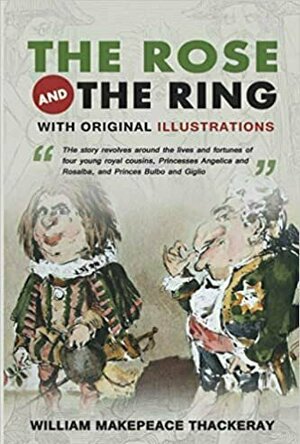
The Rose and the Ring
Book
The plot opens on the royal family of Paflagonia eating breakfast together: King Valoroso, his wife,...

Ghost Toasters - Regular Show
Games and Entertainment
App
Save the park from a ghostly invasion in this REGULAR SHOW PLATFORM SHOOTER! Gear up with the latest...

US Public Lands
Travel and Reference
App
The US Federal Governments owns nearly 650 million acres of land - almost 30 percent of the land...

Joy of Cooking
Food & Drink and Book
App
Joy of Cooking, the first cookbook in many kitchens, is now the must-have app for every...

Starbase Orion
Games
App
"The best 4X game currently available for mobile" - PocketTactics.com "This one is geek heaven" -...

Shooter Assist
Sports and Education
App
This app was created by a US Army Soldier who served on his company's Sniper team in Afghanistan as...
Bob Mann (459 KP) rated The Snowman (2017) in Movies
Sep 29, 2021
A story by bestselling Nordic writer Jo Nesbø;
Gorgeously photogenic snowy scenes of Oslo and Bergen;
A stellar cast (Michael Fassbender (“Alien: Covenant“); Rebecca Ferguson (“Mission Impossible: Rogue Nation“); J.K. Simmons (“Whiplash“); Toby Jones (“Dad’s Army“); Chloe Sevigny (“Love and Friendship“); Charlotte Gainsbourg (“Independence Day: Resurgence“, very sexy as Fassbender’s ex-squeeze) and even Val Kilmer (“Top Gun”, whose mother – interesting fact – is actually Swedish).
snowman2
That sinking feeling when you realise you’ve been drinking all night and its too late for bed before work.
And while these elements congeal in the snow together quite well as vignettes, the whole film jerks from vignette to vignette in a most unsatisfactory way. I haven’t read the book (which might be much better) but the inclusion in the (terrible!) trailers of key scenes that never made the final cut (where was the fire for example?, the fish? the man trap?) implied to me that the director (Tomas Alfredson, “Tinker, Tailor, Soldier, Spy”) and screenwriting team – Peter Straughan (also “Tinker, Tailor”), Hossein Amini (“The Two Faces of January“) and Søren Sveistrup (TV’s “The Killing”) – either didn’t have (or didn’t agree on) the direction they wanted the film to go in.
Film Title: The Snowman
Arve Stop (J.K. Simmons) and Katrine (Rebecca Ferguson) having a “Weinstein moment” at the hotel.
Nesbø (and indeed most crime writers these days) litter their work with damaged cops…. you have to question whether the detective application form has a mandatory check-box with “alcoholic and borderline psycho” on it!. This film is no exception. Fassbender plays Nesbø’s master sleuth Harry Hole: an alcoholic insomniac well off the rails between homicide cases. “If only Oslo had a higher murder rate” bemoans his boss (Ronan Vibert). He joins forces with newby officer Katrine Bratt (Rebecca Ferguson), who has her fair share of mental demons to fight, in investigating a series of missing person/murder cases. The duo unearth a link between the cases – all happen when the snow starts to fall and to particular types of women, with the protagonist leaving a snowman at the scene.
snowman5
One of the cuter snowmen… they get worse… much worse.
The plot is highly formulaic – I guessed who the killer was within about 20 minutes. But what makes this movie stand out, for all the wrong reasons, is that it has one of the most stupid, vacuous, flaccid, inane, ridiculous … (add 50 other thesaurus entries)… endings imaginable. My mouth actually gaped in astonishment!
There are also a surprisingly large number of loose ends you ponder after the film ends: why the “Snowman”‘s fixation with Harry?; what was with the “Vetlesen cleaner” subplot? How is Star Trek transportation possible in Norway? (But wait… “Telemark”… “Teleport”…. coincidence????? 🙂
On the plus side, there is some lovely Norwegian drone cinematography – (by Australian Dion Beebe (“Edge of Tomorrow“) – that immediately made me put “travel by winter train from Oslo to Bergen” on my life-map. The music by Marco Beltrami (“Logan“) is also effective and suitably Hitchcockian.
If you like your films gory, this one is definitely for you, with some pretty graphic content that (for those who like to cover their eyes) is cut to so quickly by editors Thelma Schoonmaker (“The Wolf of Wall Street“) and Claire Simpson (“Far From The Madding Crowd“) that your hands won’t have time to leave your lap! I remember this being a feature of a previous Nesbø adaptation (the much better “Headhunters” from 2011) but here it goes into overdrive.
snowman1
One of my favourite actresses – Rebecca Ferguson, curiously playing much “younger” in this film than she appears in her previous hits.
Overall this was a rather disappointing effort that was heading for a FFf rating. But just because of that ending I’m knocking a whole extra Fad off!
5 Minute Movie Guy (379 KP) rated Mad Max: Fury Road (2015) in Movies
Jun 30, 2019 (Updated Sep 16, 2019)
In Fury Road, we first encounter Max alone in the wasteland in what is about to be a very long and very bad day. He’s quickly spotted and pursued by a pack of deathly-pale skinhead warriors known as Warboys. Outnumbered and easily captured, Max is taken to The Citadel, which serves as the home of the film’s central conflict. The monstrously plagued Immortan Joe rules over The Citadel like a cult leader, promising eternal salvation to his army of Warboys who die fighting for him. The city is a place of great disparity, as Joe teases the peasants with water, while he enjoys the excesses of his precious resources. Even worse is that he’s enslaved healthy, young women, known as his Five Wives, for the sake of producing his children.
This predicament doesn’t sit well with the battle-hardened woman warrior Imperator Furiosa (Charlize Theron) who serves under Immortan Joe’s command. Tired of Joe’s tyrannous ways, Imperator Furiosa betrays her leader during a routine gas run by venturing her armored war-rig offroad with the Five Wives secretly in tow. When news spreads that Furiosa is trying to escape and has taken the Wives with her, Joe and his army of Warboys feverishly follow in pursuit. This begins an epic, elaborate, and expertly crafted chase sequence that is absolutely outrageous and unmistakably brilliant.
Meanwhile, the enslaved Max ends up being inopportunely thrust into the action at full throttle, chained to the front of a car like a hood ornament. While Max’s name may be in the title, make no mistake about it, this is Furiosa’s story. Max is primarily just along for the ride, and doing whatever he can to survive. That’s not to say that Max is simply an unfortunate onlooker to the events of the film, but he is given little in the way of dialogue and backstory, and is chained up for a substantial portion of Fury Road. Though it should be said that the movie as a whole is rather thin on story and dialogue and it merely glosses over the plot to retain its focus on the action, which is where the film really sets itself apart.
The majority of the Fury Road serves as this long, impressive chase sequence that miraculously continues to escalate as the film goes on, despite appearing to throw the whole kitchen sink at you right at the beginning. It’s explosive, crazy, and jaw-droppingly awesome from the get-go, and yet believe me, it only gets bigger and better. Just wait until later when they start adding monster trucks, mini-guns, pole-vaulters, dirt bike-riding grannies, and a guitar flamethrower. It will leave you giddy with excitement. It’s an amazing, heavy-metal, end-of-the-world spectacle that you just got to see to believe. What makes it all even more incredible is that so much of the action is achieved by practical effects, with real stunts and car crashes and explosions.
Unfortunately, in the rare moments when Fury Road lets its foot off the gas and slows down the action, it sometimes sputters. Take for instance, the film’s climactic turning point when Furiosa’s dreams are spoiled. She dramatically falls to her knees in the sand, reeling in despair, and screams out into the void. This pivotal moment should be the most powerful moment of the film, but for me it fell completely flat. The problem here is that I never felt a strong attachment to the characters. While I respect Furiosa and Max for their strength in this struggle, I also feel like I don’t know much of anything about them, except that they’re adept at surviving and have battled through Hell to get to this point. So while this brief interlude drags a bit, Max thankfully turns things back around and leads us right back into the heart of the action, where Fury Road is at its best.
Charlize Theron gives a commanding performance as Furiosa, easily establishing herself among the ranks of the great female action stars. She makes for an excellent partner to Tom Hardy’s Max (though reportedly not so much on set). Hardy, on the other hand, puts in a solid performance, but I do take some issue with it. Truthfully, he just didn’t quite feel like Mad Max. His take on the character is too rugged. He’s missing the charm and likability that Mel Gibson’s Max had. His character may be cool, but he’s difficult to relate to, and feels remarkably reduced as he grunts throughout half of the movie without uttering a word. I can’t help but feel that perhaps Hardy took Max’s madness and survival instincts a little too far. The film also stars Nicholas Hoult as Nux, the Warboy that led Max into this whole mess, who expresses a much more appealing level of craziness. Whereas Nux is an energetic, lunatic cult follower, Max seems like he’s just a few bolts short of becoming a mentally-deranged hobo, which might not bode so well for future films. Lastly, there’s Immortan Joe, played by Hugh Keays-Byrne, who has an exceptional screen presence by being imposing, frightening, and so over-the-top that he’s kind of funny.
Visually and artistically, Mad Max: Fury Road is a triumphant success. It’s more gorgeous than you would ever think possible for a decrepit, wasteland warzone. Considerable skill and attention to detail are demonstrated to bring beauty out of this decaying environment. It features first-rate cinematography and unbelievable creativity. You’ll wonder how anyone ever thought of this stuff, but you’ll be grateful they did. The characters all look outstanding, unique, and memorable. I particularly loved Furiosa’s appearance with her prosthetic arm and grease-smeared warpaint. More impressive still is the menacing Immortan Joe with his mask and elaborate body armor. Fury Road similarly has beautiful special effects which greatly enhance the atmosphere as well as the film’s many remarkable stunts. In all, this is sure to be one of the best looking films of the year.
Mad Max: Fury Road may not be a perfect film, but it makes for an explosive and unforgettable return to the series. It’s truly a creative tour-de-force, with ingenious action, stellar design, and stunning visuals. It features brilliantly choreographed fights and chases, and some of the coolest movie stunts I’ve ever seen. The movie doesn’t always get the emotional punch it’s aiming for, and it has its share of awkward moments, but it sure makes a lasting impression with its intense, adrenaline-pumping theatrics. It might be a little too strange and twisted for some (though it’s relatively tame for being rated R), however, those who can handle the wasteland are sure to find a film that is deserving of respect and admiration. While I have my gripes with Hardy’s portrayal of Max, I know that I, for one, still can’t wait to see what the future holds for everybody’s favorite road warrior.
(The review was originally posted at 5mmg.com on 5.19.15.)
Charlie Cobra Reviews (1840 KP) rated Maleficent: Mistress of Evil (2019) in Movies
Jul 7, 2020
The beginning started off strong for this movie and it immediately reminded me of what i liked about the first one. Angelina Jolie is just magnificent as Maleficent and you can tell she really enjoys acting the part. I didn't really understand why the people feared her is she wasn't a bad guy (which was the point of the first one I thought, showing the story from her side), but apparently the Queen was spreading rumors or stories to make people frightened. At the dinner scene it was quite believable from Maleficent's outburst that she might have done something to the King but to me it was too out of character that Aurora would believe her to do something like that. Also it was too Deus Ex Machina for another Fey, Connall to have been around close enough for him to save Maleficent when she is shot by an iron bullet. I really liked the scene where they fly around the underground caverns where the other Fey live and show the different biomes and talk about her unkown heritage. It bothered me that the Queen had that little fairy guy that was doing the experiments for her on his own people and how that stuff could kill him too, but what bothered me more was that it never showed his motivations when he released the little creatures in the dungeon. It just showed him do it and never said why or what changed his mind, I feel like there might have been a scene cut there or something. And then there was a couple of ridiculous scenes for me that almost killed this movie for me. One was that all the fairy creatures were invited to the wedding, which was obviously a trap with the red powder already being hinted at, but the fact that the people didn't make as much a deal about it like they did when Maleficent came to dinner surprised me. I mean they had guards holding back the citizens but when Maleficent appeared they ran away, wouldn't they have acted similarly if there were monsters coming to their kingdom. The attack by the Dark Fey on the castle was also one of those parts that made me wonder what the hell was going on. They are massacred on a big scale by the red powder which earlier in the film, it said that it was hard to make or took a long time, but they had butt loads of it in this battle. They had so much that when the Dark Fey retreat and change where they attack the humans even had traps setup in those areas as well. I mean it made for an interesting intense battle scene but Maleficent was the only one of her kind the humans had ever seen and only the Queen's servant said she saw one similar to her save her from the water. How did they know an army was coming and attacking by air. Good planning, smart Queen I guess. I was greatly disappointed that Maleficent didn't turn into a dragon like the cartoon. I love seeing a good dragon on screen but I guess the Phoenix was a good change and fit more with the story especially with her sacrifice. Phoenix's are reborn from their ashes as it says. The last part I found to be laughable was that when the battle is over Aurora is like, "Weddings back on". Her and the Prince are like, we will live in peace from now on with the Moors. Ok, you were just killing each other a couple of minutes ago, and so many Dark Fey died it wasn't even funny. Oh yeah, this movie also did quite a great job of hiding any blood whatsoever in a lot of scenes where there probably should have been some maybe a little. I mean Maleficent gets shot, Connall gets shot up like swiss-cheese, and the soldiers are shooting in the final battle and everyone has weapons like axes, swords, etc.. I really wanted to give this movie a 7 but I have to give it a 6/10.
